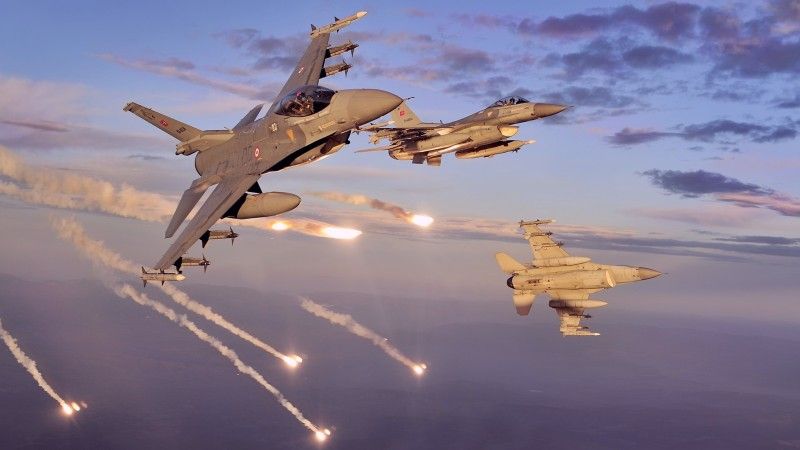Defence Policy
Türkiye through the eyes of NATO allies

Photo. NATO
Despite the growing criticism towards Türkiye and its multi-directional policy aimed at balancing between different ideological blocs, there is no doubt that Ankara plays a deeply important role within NATO. Thanks to its geographical location, it can act as a geopolitical bridge between the collective West and the Middle East and even Central Asia. Additionally, its modern and well-developed military, the second largest in NATO, significantly strengthens the southern flank as well as provides significant manpower and resources for allied operations and exercises carried out internationally.
The most recent of these exercise took place from December 4 to 15, when F-4E Phantom II long-range fighters took part in joint exercises in northern Italy. Thus, the Phantoms of the Turkish Air Force joined American (F-16) and Italian aircraft (including F-35, Eurofighter, Tornado, KC-767 tanker, MQ-9, F-35B, AV-8B Harrier) during the exercises Poggio Dart 23 (PODA 23). The aim of the exercises was, among others goals, testing NATO’s deployable air command and control center as well as its ability to command multinational air forces.
Earlier, on November 30, four Turkish F-16 fighters arrived at the 86th Borcea Air Base in Romania to reinforce the NATO Air Policing mission. Thus, they will fly alongside Romanian and German jets to protect NATO airspace on the shores of the Black Sea and deter potential air threats.
From the Polish perspective, it is worth mentioning the „Anaconda 23” exercises, organized in May this year at the Land Forces Training Center (Nowa Dęba). The USA, Romania, Slovenia, Sweden, France, Lithuania, Latvia, Estonia and the above-mentioned Türkiye, whose fighters were sent to Poland in 2021 to strengthen air control in the north, took part in them.
Türkiye's relations with third countries
Although Türkiye’s contribution to strengthening the Alliance’s potential is unquestionable, the state’s rhetoric on sensitive issues may raise concerns among allies. Apart from the issue of purchasing the S-400 from Russia and the bilateral relations still maintained with it, it is worth taking a look at Ankara’s other relations with third parties that are not NATO members.
For example, in September 2022, Erdoğan openly mentioned the possibility of Türkiye joining the Shanghai Cooperation Organization (SCO), in which China plays the role of the undisputed leader. A few days after an extended meeting of the heads of SCO member states at a summit in Samarkand, Uzbekistan, the Turkish leader flew to New York, where he delivered a speech to the UN General Assembly in which he argued that Türkiye was a key part of NATO. This behavior of Turkish politicians no longer surprises either analysts or state leaders themselves. Nevertheless, it does not go unnoticed. Closer Türkiye-SCO cooperation would also pose an operational challenge to transatlantic security cooperation. Membership in this specific organization would certainly encourage other NATO countries to be more reserved in sharing critical information with Türkiye.
Sweden's accession to NATO with the F-16 in the background
The strategic shift in Turkish policy illustrates a broader trend toward the erosion of transatlantic security cooperation. The crisis of confidence on both sides is also fueled by the lack of significant progress in military-technical cooperation.
At this point, it is of course worth mentioning the unfinalized purchase of the F-35 and F-16 from the US, which is still under debate. Despite previous assurances, this issue is inextricably linked to Türkiye’s ratification of Sweden’s NATO membership. Although the ratification document was submitted to parliament on October 23, Turkish decision-makers clearly emphasize that they see no need to speed up this process. In this way, they make it clear to other allies that a single country thousands of kilometers away from them is not a priority for them. Devlet Bahceli, leader of the National Movement Party (MHP) allied with Erdoğan, opposes the acceptance of Sweden’s membership application. Taking into account his relations with the Justice and Development Party (AKP), it may seem that in this way he seeks to buy Erdoğan time until the visit of Russian President Vladimir Putin, which is scheduled for early 2024. Another reason may be an attempt to shift the responsibility for obtaining Sweden’s consent onto the Republican People’s Party (CHP). If the above motion is quickly adopted, the opposition may accuse the government of a policy of „giving everything away”, which will certainly not have a positive impact on their results during the next local elections, scheduled for March 2024.
The Biden administration continues to urge the Turkish government to honor its promise to Western allies „without further delay” and do whatever is necessary to approve Sweden’s NATO membership. Ankara, on the other hand, expects a „green light” to purchase the F-16, in return for which it is ready to agree to Sweden’s accession. President Recep Tayyip Erdoğan in his statement said that he had fulfilled his obligation by presenting the protocol to the Turkish Grand National Assembly and therefore now has the right to set his own expectations towards the US regarding the F-16. To sum up, distrust on both sides has led to neither party wanting to take the first step for fear that their partner will renege on their promises after receiving what they want most.
Although the possibility of Sweden’s NATO accession protocol being rejected by the Turkish Grand National Assembly is relatively low, the risk still exists and it would not be the first time that Turks have opposed American demands. An example is a government memorandum authorizing the US to deploy troops to Turkish territory to occupy Iraq. Despite intensive negotiations between the two countries, on March 1, 2003, this request was rejected in the Turkish Grand National Assembly, which caused a serious crisis between Ankara and Washington.
Which door will Türkiye knock on?
Another problem in the field of technology transfer is Germany’s opposition to Türkiye’s request to purchase the Eurofighter Typhoon. In November this year Türkiye announced that, in line with the US position, it has asked Great Britain and Spain to purchase 40 Eurofighter aircraft. This idea was criticized by Germany, which is deeply concerning to Türkiye considering that these planes are produced by a consortium consisting of Germany, Spain, Great Britain and Italy.
In response to Berlin’s opposition, Turkish Defense Minister Yaşar Güler criticized the attitude of the NATO ally. Shortly after his statement, reports about the possible purchase of Sino-Pakistani JF-17s began to appear in the Turkish media. This lightweight, multi-role fighter can carry electro-optical/infrared sensors and self-defense jammers on external pods, and while it cannot be compared to the cutting-edge Stealth F-35 or J-20 fighters, or even fighters like the Rafale and Su-35, its reduced price relative to said fighters makes it incredibly appealing, especially considering the integration of the AESA and PL radar. The cost of the Pakistani variant is estimated at around $32 million.
President Erdoğan said after his visit to Berlin: „We have already given the answer… Or maybe we don’t have doors to knock on? No, we have plenty of them”. Minister of National Defense Yaşar Güler, in turn, confirmed Türkiye’s growing demand for combat aircraft, arguing that the distance covered by UAVs and UCAVs is important, but the defensive function and strategic multiplier effect of each combat vehicle is different. Although the plan to purchase the FJ-17 has not been officially confirmed, it is certain that it would be criticized by the same NATO countries that opposed the sale of European Eurofighters, which will bring mutual accusations and distrust between allies once again.
One step closer to Turkish-Greek reconciliation
Greece, which has faced great tensions in its relations with Türkiye in recent years, has also expressed its willingness to purchase 40 American F-35 aircraft. Türkiye, in turn, is interested in 40 new models of F-16 fighters and 79 modernization kits aimed at renewing the existing fleet. There is no doubt that the actual enforceability of both agreements is disproportionate in favor of the Greece.
The Biden administration reportedly allows for the possibility of simultaneous notification to Congress about the sale of F-16 aircraft to Türkiye and F-35 aircraft to Greece, intended to be part of a package strengthening allies on NATO’s southern flank against Russia. This is therefore intended to prevent congressional objections to arms sales to Türkiye.
Washington has been trying to influence Ankara’s bilateral relations with Athens a significant period of time. Especially as a result of Russian aggression against Ukraine, the USA has prioritised improving Turkish-Greek relations to strengthen the alliance in the region. Encouraging both countries to avoid moves that bring them into conflict and to resolve issues through positive dialogue has finally brought the expected result. The parties have recently taken concrete steps to repair existing relations. Thus, Erdoğan took part in the fifth meeting of the Türkiye-Greece High-Level Cooperation Council in Athens, where, together with Greek Prime Minister Kyriakos Mitsotakis, he expressed readiness to open a new chapter in mutual relations. This is the news that not only Washington has been waiting for, but also Brussels, which has made Türkiye’s possible membership in the European Union conditional on continually improving its relations with its neighbors.
Israeli-Palestinian conflict
This is not the first time that NATO allies have found themselves on different sides of a conflict. The latest example of this is the attitude of Türkiye and the United States towards the situation in Gaza. It does not seem possible for the two to reach an agreement regarding Israel at this time. White House statements emphasize Israel’s „right to self-defense.” The statement issued by Türkiye reiterates Ankara’s expectations that the US should „withdraw its unconditional support for Israel”. Unlike other regional conflicts, this time it does not seem that Türkiye is still interested in fighting for the position of mediator. Unquestionable support for one of the parties to the conflict actually ruins these chances, even if Ankara decides to make another change in its foreign policy. Although this topic is discussed with most of the countries involved in an atmosphere of relative understanding and calm, the dialogue with the United States, which is Israel’s largest ally, makes the Alliance concerned.
In NATO but outside the EU
The situation within NATO is further complicated by the involvement of most of its countries in the functioning of the European Union. In addition to the Republic of Cyprus joining the community in 2004, it is worth paying attention to the latest EU regulations. The European Council decided to start accession talks with Ukraine and Moldova. Georgia, on the other hand, obtained the status of a candidate country. In the case of all three countries, the level of fulfillment of the criteria necessary for their accession may be questioned. In the case of Ukraine and Georgia, problems with sovereignty on their external borders may also be worrying. Although these negotiations do not mean the automatic inclusion of these countries in the EU, there is no doubt that this topic was quickly taken up in the public debate in Türkiye itself, which obtained the status of a candidate country already in December 1999. Although its chances for membership are currently extremely low, there is no doubt that Ankara seeks to strengthen its position as a partner country, while expecting a full customs union and liberalization of the visa regime.
For Ankara, the different aspects of its foreign policy, including maintaining the status of an active NATO member while being engaged in cooperation with entities challenging the collective West, are not contradictory. On the contrary, they are an integral part of this country’s 360-degree foreign policy. Flexibility and strategic independence are factors that, in the opinion of local decision-makers, aim to rebuild Türkiye’s historical role as a world power.
